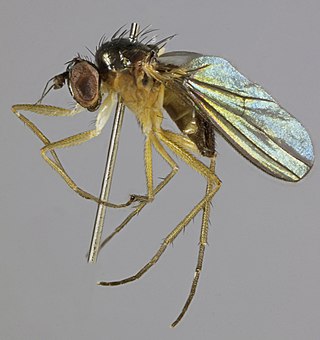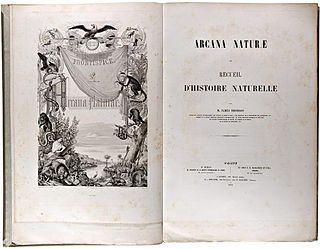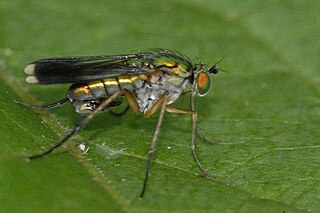Félix Pierre Jousseaume was a French zoologist and malacologist. He studied medicine in Paris where he then practised. His thesis was Des Végétaux parasites de l'Homme. He participated in the founding of the Société zoologique de France and was President of that society in 1878.

Marie Maxime Cornu was a French botanist and mycologist. He was a younger brother of physicist Alfred Cornu (1841-1902).

Anepsiomyia is a genus of flies in the family Dolichopodidae. It contains only one extant species from Europe, Anepsiomyia flaviventris, as well as two fossil species from the Eocene of Russia and Belarus. The systematic position of the genus is currently uncertain: it has been variously placed in subfamilies such as Sympycninae and Peloropeodinae.

Diaphorus is a genus of flies in the family Dolichopodidae. Lyroneurus was formerly considered a subgenus, but is now either treated as a synonym of Chrysotus or treated as a distinct genus.
Palaeoargyra is an extinct genus of flies in the family Dolichopodidae, known from Baltic amber. It contains only one species, Palaeoargyra mutabilis. It was originally proposed as a subgenus of Argyra, but was later considered a separate genus.
Palaeomedeterus is an extinct genus of flies in the family Dolichopodidae, known from Baltic amber and Cambay amber from the Eocene. The genus was first proposed by Fernand Meunier in 1895 with no included species or description, though illustrations were provided for six different unnamed species.
Wheelerenomyia is an extinct genus of flies in the family Dolichopodidae that lived during the Eocene of the Baltic region. The genus currently contains 13 species, all of which were described from Baltic amber. Within the family Dolichopodidae, Wheelerenomyia is considered to be a member of the subfamily Sciapodinae, but its wing vein M is unbranched and strongly curved so it is considered closely related to members of the tribe Mesorhagini. The genus was first described in 1907 by Fernand Meunier, who named it after William Morton Wheeler.

Leptopeza is a genus of flies in the family Hybotidae.

James Livingston Thomson was an American entomologist who studied Coleoptera independently and mostly lived in France. A member of the Société entomologique de France, his collections of Cerambycidae, Buprestidae, Cetoniinae and Lucanidae were eventually sold to René Oberthür.

Poecilobothrus is a genus of flies in the family Dolichopodidae.

Lygistorrhininae, commonly called long-beaked fungus gnats is a subfamily of flies in the Diptera family Keroplatidae. The groups was long treated as a separate family, but molecular phylogenetic analysis has shown it to belong to Keroplatidae. There are about 7 genera and at least 30 described species in Lygistorrhininae.
Prohercostomus is an extinct genus of flies in the family Dolichopodidae, known from Baltic amber from the Eocene. It was originally created as a subgenus of Hercostomus, but was later raised to genus rank.

Microphor is a genus of flies in the family Dolichopodidae, subfamily Microphorinae.
Apalocnemis is a genus of flies in the family Empididae.
Anaclileia is a genus of flies belonging to the family Mycetophilidae.

Oedalea is a genus of flies in the family Hybotidae.
Cacosis is a genus of flies in the family Stratiomyidae.
Micrempis is a genus of flies in the family Hybotidae.
Dysaletria is a genus of flies in the family Hybotidae.








